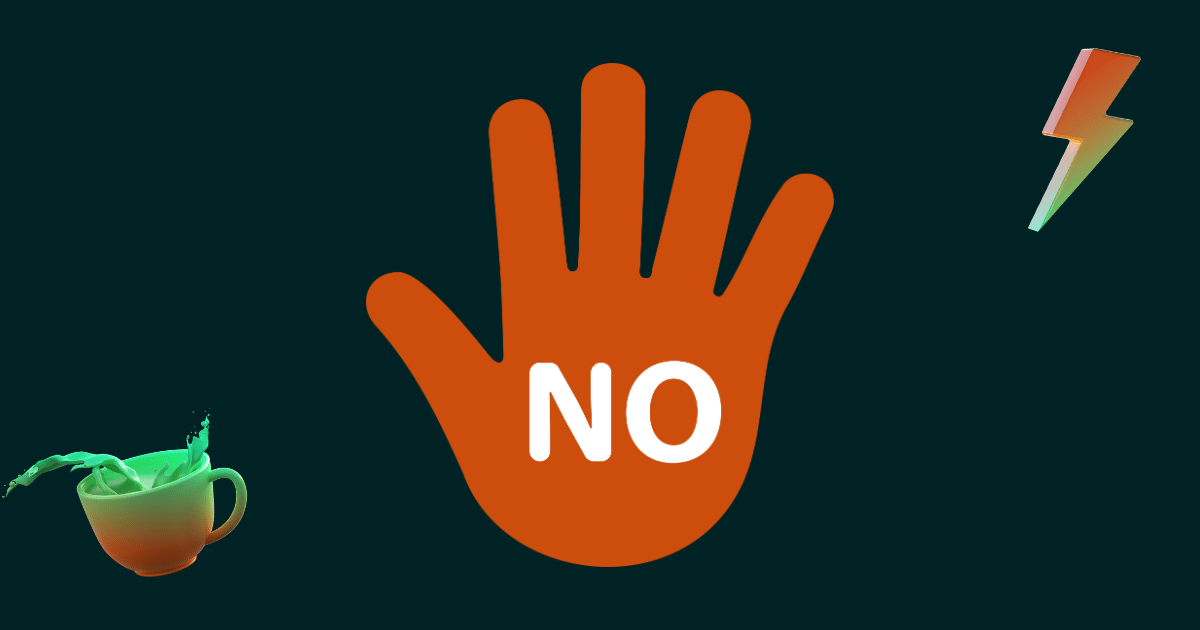Saying NO is not a free action in the world of software engineering


We all agree: saying no is important – it can be liberating, support work-life balance, and is a crucial life skill.
What’s discussed far less is the cost of refusing, especially the psychological cost. That’s what I’d like to explore: the emotional toll of refusing – on ourselves and on those we ask for something, even when we reassure them, “It’s totally fine if you can’t.”
It’s hard to refuse – and all too easy to agree
Overall, saying no often carries negative connotations, which is why we tend to avoid it. We dislike being in situations where our words or actions might be perceived as negative. It becomes even more difficult to decline in person – especially when we know the person well or feel emotionally connected to them or the topic.
People are generally more dismissive online or in anonymous settings, where the perceived consequences are minimal. It’s much easier to ignore or mock a request to “like” a post on social media than to say no to your mum when she asks for help picking apples.
In a professional setting, declining becomes even more complicated.
We’ve created a work culture where declining requests too often can feel like a career risk, especially for women and members of minority groups. Declining isn’t only disappointing for the person who asked; it might also mean missing out on a promotion or an exciting opportunity. Holy carp!
Conversely, accepting is effortless.
It feels nice and positive. You’re pleasing the other person, maybe even securing a future reward for yourself. What could be better? Since humans are wired to chase immediate rewards and often overlook future pain, we tend to say yes just to see that happy twinkle in someone’s eye – consequences be damned!
If you Google “how to say no”, you’ll get a lot of results, mostly focused on the actual skill of rejecting something. If you Google “how to say yes”, you mostly get results about how to say words and phrases in different languages. Declining is a tricky soft skill; accepting is often just about language.
Turning something down is… stressful.
So, where are we with no?
- We’re not that great at saying it.
- It’s not a pleasant thing to do.
- It can have negative consequences.
As a result, it’s often stressful to refuse a request.
We tend to worry about it before, during, and after the fact. This stress can be even worse if we’re already dealing with things like burnout, impostor syndrome, or anxiety. Saying no in those situations can feel like adding fuel to the fire. If I already don’t believe I’m doing a stellar job, turning something down might only reinforce the fear that others see me as a failure.
Our tendency toward herd mentality doesn’t help either. When most of the team says yes and we’re the only ones who want to say no, we often end up going along with the group, even if we feel conflicted inside.
Many of us have experienced this in sprint planning and sprint reviews – the team takes on more work than necessary during planning to avoid refusing requests, and then feels deflated and disappointed when they can’t deliver everything by the end. Over time, this can hurt team morale and spirit, lower motivation, and even create a toxic dynamic between teams and their stakeholders.
All of this leads to a simple point: refusing comes with its own burden. Telling someone to “just say no” can be disingenuous – placing the emotional and social cost of rejection on them, while pretending it’s easy.
Expecting a simple refusal hurts the ones who care most
The people who are most invested in a project, those who care deeply about the quality of their work and their team’s delivery, often your “best performers”, are usually the ones who find it hardest to say no. As a result, they often take the initiative to pick up tasks that others might reject.
If you keep asking, they may continue to agree, depending on their situation, until they eventually hit a wall and burn out.
Be kind. Don’t act like no is just a simple word
We should be mindful of our colleagues’ workloads and, whenever possible, avoid asking them for additional tasks if we know they might already have a full plate.
It’s important to recognize that they may feel unable or reluctant to refuse, even when they want to. And even when they do refuse, it can still come at a cost to their emotional well-being or personal life.
We should also recognize that refusal comes in many forms. It can mean:
- Literally saying no.
- Taking only 5 tasks out of 10 that were offered.
- Choosing not to volunteer when most others do.
- Not attending a meeting or participating in a Slack discussion.
All of the above can be difficult to do and may lead to negative consequences down the road, for both the individual and the team.
What’s the solution?
- Talk openly with your colleagues. Be aware of the challenges they face and the workloads they carry. Don’t expect them to simply reject additional work – understand their situation through honest conversations.
- Keep expectations realistic. Avoid presenting people or teams with overwhelming wish lists they can’t reasonably deliver. Don’t assume others will just say no to unreasonable demands.
- Diversify your requests for help. Instead of always turning to the same people who tend to say yes, reach out to others and distribute the load more evenly.
- Avoid herd mentality pressure. Give individuals space and time to make decisions independently, and encourage sharing outcomes in a safe environment. This is why practices like writing retrospective points individually or revealing estimations simultaneously in planning poker are important.
- Lead by example. Show that saying no when it’s appropriate is acceptable. Recognize that you might also struggle with this and discuss it openly with your team.
- Establish fair systems and processes. Ensure workloads are distributed transparently and fairly, rather than relying on informal methods that often favor those who find it easier to say no – which can unfairly burden those who care most about the project’s success.
- Don’t reward or idolize overwork. Encourage a culture that values balance and sustainable effort over relentless hustle.



